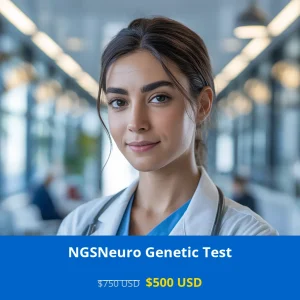ECHS1 Gene Mitochondrial Short-Chain Enoyl-CoA Hydratase 1 Deficiency NGS Genetic DNA Test
Understanding ECHS1 Gene Deficiency
The ECHS1 Gene Mitochondrial Short-Chain Enoyl-CoA Hydratase 1 Deficiency NGS Genetic DNA Test represents a breakthrough in diagnosing rare mitochondrial disorders. This comprehensive genetic analysis targets the ECHS1 gene, which encodes a critical enzyme involved in mitochondrial fatty acid beta-oxidation. When this gene contains mutations, it disrupts the body’s ability to properly metabolize fatty acids, leading to severe neurological and metabolic complications.
Mitochondrial disorders affect approximately 1 in 5,000 individuals, making accurate diagnosis essential for proper management and treatment. The ECHS1 gene deficiency specifically impacts the second step of fatty acid oxidation, where short-chain enoyl-CoA hydratase converts enoyl-CoA to 3-hydroxyacyl-CoA. This disruption in energy metabolism can have devastating effects on multiple organ systems, particularly the nervous system.
What This Test Detects
Our advanced NGS Genetic DNA Test specifically identifies:
- Pathogenic mutations in the ECHS1 gene
- Single nucleotide variants (SNVs) affecting enzyme function
- Insertions and deletions disrupting gene expression
- Compound heterozygous mutations
- Novel genetic variants with potential clinical significance
The test utilizes next-generation sequencing technology to provide comprehensive coverage of the entire ECHS1 gene coding region, including all exons and flanking intronic regions. This ensures maximum detection sensitivity for both known and novel mutations associated with mitochondrial short-chain enoyl-CoA hydratase deficiency.
Who Should Consider This Test
Clinical Indications and Symptoms
This genetic test is recommended for individuals presenting with:
- Progressive neurological deterioration in infancy or childhood
- Developmental regression or delayed milestones
- Leigh syndrome-like symptoms
- Metabolic acidosis episodes
- Hypotonia (reduced muscle tone)
- Epileptic seizures unresponsive to conventional treatment
- Abnormal brain MRI findings, particularly in basal ganglia
- Family history of mitochondrial disorders
- Unexplained metabolic crises
High-Risk Populations
Individuals with consanguineous parents or those from populations with known founder mutations should consider proactive testing. Early diagnosis can significantly impact treatment outcomes and quality of life.
Benefits of ECHS1 Genetic Testing
Undergoing this comprehensive genetic analysis provides numerous advantages:
Accurate Diagnosis
Provides definitive diagnosis for complex neurological presentations, eliminating years of diagnostic uncertainty and unnecessary testing.
Personalized Treatment Planning
Enables development of targeted treatment strategies, including specific dietary modifications and medication adjustments tailored to individual genetic profiles.
Family Planning Guidance
Offers crucial information for genetic counseling and reproductive decision-making, including carrier testing for family members.
Proactive Management
Facilitates early intervention strategies that can potentially slow disease progression and improve long-term outcomes.
Understanding Your Test Results
Positive Results
A positive result indicates the presence of pathogenic mutations in the ECHS1 gene. Our genetic counselors will provide comprehensive interpretation, including:
- Specific mutation details and inheritance patterns
- Clinical implications and prognosis
- Recommended management strategies
- Family testing recommendations
Negative Results
A negative result suggests no pathogenic ECHS1 mutations were detected. However, this doesn’t completely rule out mitochondrial disease, as other genetic causes may be responsible for symptoms.
Variant of Uncertain Significance (VUS)
Some results may identify genetic changes with unknown clinical significance. Our team provides ongoing monitoring and reclassification as new research emerges.
Test Pricing and Details
| Test Component | Price (USD) |
|---|---|
| Discount Price | $500 |
| Regular Price | $700 |
| Turnaround Time | 3-4 Weeks |
| Sample Type | Blood, Extracted DNA, or One Drop Blood on FTA Card |
Pre-Test Requirements
Before scheduling your ECHS1 genetic test, please ensure:
- Complete clinical history documentation
- Genetic counseling session to create family pedigree chart
- Discussion of testing implications with healthcare provider
- Understanding of potential outcomes and next steps
Nationwide Availability
General Genetics Corporation provides comprehensive genetic testing services across the United States. We have conveniently located branches in all major metropolitan areas, including:
- New York City and surrounding regions
- Los Angeles and Southern California
- Chicago and Midwest locations
- Houston and Texas facilities
- Multiple East Coast and West Coast centers
Take the Next Step Toward Diagnosis
Don’t let uncertainty about mitochondrial disorders delay proper diagnosis and treatment. Our specialized ECHS1 genetic testing provides the clarity needed for effective medical management. Contact our genetic specialists today to schedule your test and begin your journey toward accurate diagnosis and personalized care.
Call or WhatsApp: +1(267) 388-9828 to book your ECHS1 Gene Mitochondrial Short-Chain Enoyl-CoA Hydratase 1 Deficiency NGS Genetic DNA Test today. Our compassionate team is ready to assist you with scheduling, insurance questions, and any concerns about the testing process.







